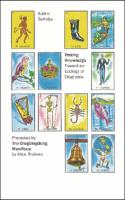Testing Knowledge
Toward an Ecology of Diagnosis, Preceded by the Dingdingdong Manifesto
Author(s)
Solhdju, Katrin
Rivières, Alice
Contributor(s)
Stengers, Isabelle (other)
Wexler, Alice (other)
Collection
ScholarLedLanguage
EnglishAbstract
"This volume presents the collective adventure of Dingdingdong, the Institute for the Co-production of Knowledge about Huntington’s Disease, founded in 2012 between Paris and Brussels.
Katrin Solhdju’s Testing Knowledge: Toward an Ecology of Diagnosis pursues the question of taming the violence of the new species of medical foreknowledge represented by genetic testing. Adopting historical and epistemological perspectives on diagnostic situations, including observations from anthropological field research, speculative storytelling, and ancient oracles, Testing Knowledge proposes a new ecology of predictive diagnostic gestures, which potentially concern us all.
Testing Knowledge is preceded by the Dingdingdong collective’s Manifesto (2013), which tells the story of the young Alice Rivières, who in 2006 took the presymptomatic, genetic test, foretelling her that she will eventually develop Huntington’s. Her first-person account of the revelation of her test results, which she experienced as an act of poisoning or cursing, pulls the reader into the manifold ethical, psychological, and existential issues inherent to medical predictions.
Testing Knowledge is also preceded by a foreword from Alice Wexler, author of Mapping Fate: A Memoir of Family, Risk, and Genetic Research, and is followed by an afterword by philosopher Isabelle Stengers."
Keywords
epistemology, Huntington's disease, medicine, medical ecology, patient empowermentDOI
10.21983/P3.0307.1.00ISBN
9781953035455, 9781953035462Publisher
punctum booksPublisher website
https://punctumbooks.com/Publication date and place
Brooklyn, NY, 2021Imprint
Ecologies BookClassification
Doctor / patient relationship
Neurology and clinical neurophysiology


 Download
Download